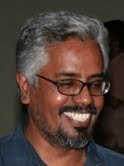OUSMANE SEMBENE

Remembering the Father of African Cinema, Ousmane Sembene
I repeat: cinema is a night school! A society that does not exude a new culture is bound to die. Jig about girls and boys, the cicada do it every night! That's not culture!
Ousmane Sembene
Ousmane Sembène, writer, filmmaker, poet and dramatist, considered one of the greatest authors of sub-Saharan Africa and the "Father of African film." passed away last month in Dakar. Born into a fisherman family, and studying in an Islamic and later French school, Sembène was drafted into the French Army in World War II. After the war he returned to his home country, and in 1947 participated in a long railroad strike on which he later based his seminal novel God's Bits of Wood.
Late he moved to France, where he worked and becoming active in the French trade union movement. He joined the Communist party, helping lead a strike to hinder the shipment of weapons for the French colonial war in Vietnam. His writing career began with the novel The Black Docker (1956) which was about French racist experiences. His later writings were about various layers and dimensions of oppression and resistance in his own native land. Novels like God's Bits of Wood, Oh Country, My Beautiful People, Xala etc looked at African society and experience in a relentless and incisive manner. His film career began with Borom Sarret (1963) followed by striking works like La Noire de...(1966), Mandabi (1968), Xala (1974), Ceddo (1977), and Moolaadé (2004).
All his films won international acclaim but he was always deeply concerned about the post-colonial traumas of a developing Africa, and he considered that film was a powerful medium to reach his people. In the words of the Mauritian filmmaker Med Hondo, "Of all African film directors, Sembene is the first to confer value to images." Like all colonial intellectuals his was also a journey from his native land to the West and back. Ideologically also his was a journey that traversed a complex and tortuous path that imbibed local experiences and Western ideas, and Marxism was an essential part of that. This move was paralleled by the shift in language from French to his local languages. And in the process he combined in his work a very keen sense of postcolonial dilemma inherent not only in the creative process within himself as an African artist, but also those animating the social and economic processes that engulfed his society. In film after film, he analysed the barriers and shackles that bound his culture. It is this concern for 'value' in images that make Sembene different from the rest of the postcolonial filmakers of his generation, who either wallowed in the decadence of their economic and cultural processes or played up to Western tastes to make their works 'international'.
According to film scholar Samba Gadjigo, "Ousmane Sembene's forty year film work bears an unparalleled social and artistic significance in the context of both world and African cinema. His images are intended not only for entertainment and profit, but rather as an educational tool. His work is aimed at promoting freedom, social justice, and at restoring pride and dignity to African people. To reach such a goal, Sembene seeks first to "indigenize" the medium by resorting first to the use of African languages (Wolof and Diola, two Senegalese languages, and Bambara) Secondly, this primary emphasis on language allowed him to specify his public : " Africa is my "audience" while the West and the "rest" are only targeted as "markets". Thirdly, he borrows from the rich heritage of African oral narratives, handed down by the griots and rejecting a mere imitation of Hollywood's narrative techniques, Sembene's cinema ushered in a genuinely African film aesthetics. "We will never be Arabs or Europeans; we are African". Sembene's cinema uses the tools provided by Marxist analysis and the passion of a visionary who profoundly believes.. that only creation gives meaning to life. "
Labels: african cinema, ousmane sembene, Samba Gadjigo


